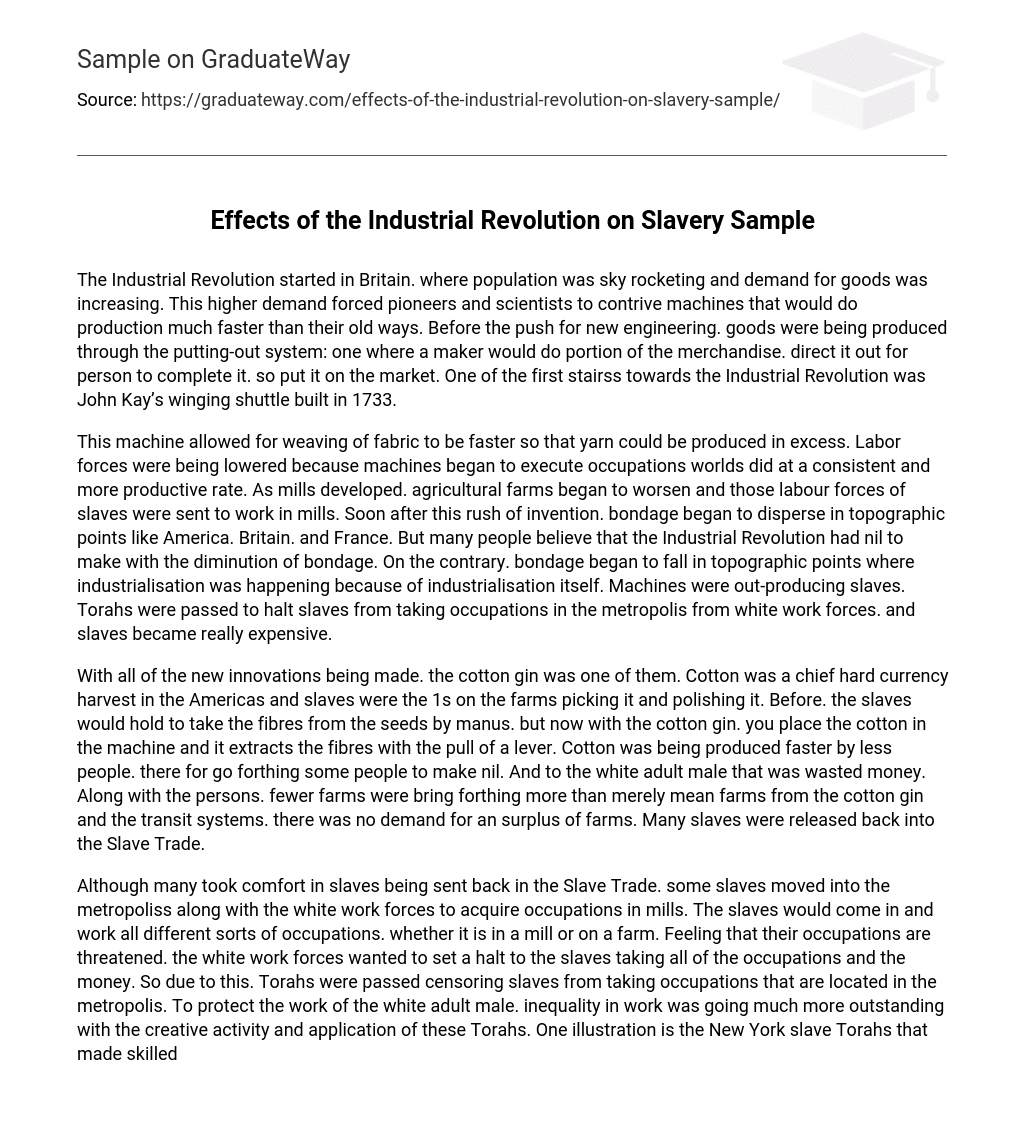The Industrial Revolution started in Britain. where population was sky rocketing and demand for goods was increasing. This higher demand forced pioneers and scientists to contrive machines that would do production much faster than their old ways. Before the push for new engineering. goods were being produced through the putting-out system: one where a maker would do portion of the merchandise. direct it out for person to complete it. so put it on the market. One of the first stairss towards the Industrial Revolution was John Kay’s winging shuttle built in 1733.
This machine allowed for weaving of fabric to be faster so that yarn could be produced in excess. Labor forces were being lowered because machines began to execute occupations worlds did at a consistent and more productive rate. As mills developed. agricultural farms began to worsen and those labour forces of slaves were sent to work in mills. Soon after this rush of invention. bondage began to disperse in topographic points like America. Britain. and France. But many people believe that the Industrial Revolution had nil to make with the diminution of bondage. On the contrary. bondage began to fall in topographic points where industrialisation was happening because of industrialisation itself. Machines were out-producing slaves. Torahs were passed to halt slaves from taking occupations in the metropolis from white work forces. and slaves became really expensive.
With all of the new innovations being made. the cotton gin was one of them. Cotton was a chief hard currency harvest in the Americas and slaves were the 1s on the farms picking it and polishing it. Before. the slaves would hold to take the fibres from the seeds by manus. but now with the cotton gin. you place the cotton in the machine and it extracts the fibres with the pull of a lever. Cotton was being produced faster by less people. there for go forthing some people to make nil. And to the white adult male that was wasted money. Along with the persons. fewer farms were bring forthing more than merely mean farms from the cotton gin and the transit systems. there was no demand for an surplus of farms. Many slaves were released back into the Slave Trade.
Although many took comfort in slaves being sent back in the Slave Trade. some slaves moved into the metropoliss along with the white work forces to acquire occupations in mills. The slaves would come in and work all different sorts of occupations. whether it is in a mill or on a farm. Feeling that their occupations are threatened. the white work forces wanted to set a halt to the slaves taking all of the occupations and the money. So due to this. Torahs were passed censoring slaves from taking occupations that are located in the metropolis. To protect the work of the white adult male. inequality in work was going much more outstanding with the creative activity and application of these Torahs. One illustration is the New York slave Torahs that made skilled black craftsmans give up their occupations. 20 people were killed in the support of that jurisprudence. After a slave rebellion in New York. the slave Torahs merely got stricter. Due to this jurisprudence. slaves were forced to acquire the harshest of occupations ; occupations like in agribusiness and excavation. New York continued to import slaves though. regardless of the rebellions that were traveling on. Finally in 1731 New York began commanding everything slaves and liberate inkinesss did. from forenoon to dark.
Even when slaves did acquire occupations in topographic points like mills before these Torahs were passed. they were still much more expensive than the mean on the job adult male. Back so the demand for a occupation in a mill was highly high. Some people were out of occupations merely because they were all already taken. So with this big waiting list. if one worker got ill or couldn’t work for any ground. they would be immediately replaced. And the best portion about holding worker who you don’t ain is that you do non hold to take attention of them. Slave proprietors would hold to pay their slaves for working on top of feeding them. giving them shelter. and paying for them. Slaves became excessively much of a fuss to maintain around in a capitalistic society.
Slaves were sent to the underside of society and even free inkinesss were treated ill every bit good. Topographic points where bondage was really outstanding like the Americas began export slaves as they tried to acquire rid of the load and halt the trade. Americans eventually stopped take parting in the Slave Trade which helped convey it down and reconstruct at least a small spot of equality.
Everyone believes that it was merely the Emancipation Proclamation that stopped the usage of bondage around the universe. when in fact ; industrialisation had a important part every bit good. The Industrial Revolution brought machines to the universe that could bring forth merchandises faster and better than worlds. it brought Torahs that protected the white man’s right to a metropolis occupation. and it brought the realisation of the load of slaves. All of these things greatly added to the diminution of bondage and finally to the terminal of it.
Bibliography
- Beard. Charles A. The Industrial Revolution. New York: Greenwood Press. 1969 Beaudoin.
- Steven M. The Industrial Revolution. Boston: Houghton Mifflin. 2003 Inikori.
- Joseph E. “Global Repercussions” in Africans and the Industrial Revolution in England: A Study in International Trade and Economic Development. Deutsch. Sarah. Carol Karlsen. Robert G. Moeller. and Jeffrey N. Wasserstrom. Ed. New York: Oxford University Press. 2002. 97-111.
- Williams. Eric. Capitalism and Slavery. Chapel Hill: University of North Carolina Press. 1994
- Inikori. Africans and the Industrial Revolution in England: A Study in International Trade and Economic Development. 22 [ 2 ] . Williams. Capitalism and Slavery. 56





